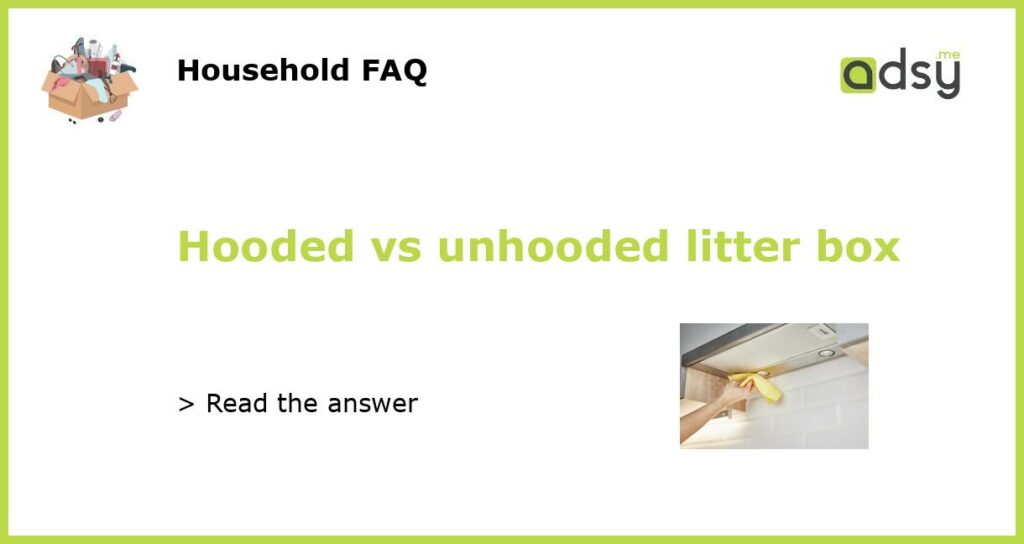Hooded vs Unhooded Litter Box: Which One is Best for Your Cat?
If you’re a cat owner, you know that providing the right litter box is essential for your furry friend’s comfort and happiness. One of the key decisions you’ll have to make is whether to choose a hooded or unhooded litter box. Both options have their own advantages and disadvantages, so it’s important to consider your cat’s needs and preferences before making a decision.
The Benefits of a Hooded Litter Box
Many cat owners opt for a hooded litter box because it offers several benefits. One of the main advantages is that it helps contain odors. The enclosed design of a hooded litter box prevents smells from spreading throughout your home, making it more pleasant for both you and your cat. Additionally, the hood helps to control litter tracking, reducing the amount of litter that gets scattered around your house.
Another benefit of a hooded litter box is that it provides your cat with privacy. Some cats prefer to do their business in a private space, away from prying eyes. Having a hooded litter box allows them to feel more secure and comfortable while doing their business.
Furthermore, if you have multiple cats, a hooded litter box can help reduce territorial marking. The enclosed design creates separate compartments for each cat, minimizing the chances of conflicts or dominance-related behaviors between them.
The Drawbacks of a Hooded Litter Box
While a hooded litter box can be beneficial in many ways, it also has some drawbacks to consider. One potential downside is that the enclosed space may make some cats feel trapped or claustrophobic. Cats are naturally cautious animals, and they like to have an escape route in case they feel threatened. The cover of a hooded litter box may limit their ability to assess their surroundings, potentially causing stress or anxiety.
Another downside is that hooded litter boxes may retain more odor than unhooded ones. While the hood can help contain smells initially, it can also trap them inside the litter box, making it harder to eliminate the odor completely. Regular cleaning and maintenance are crucial to prevent any buildup of unpleasant smells.
The Benefits of an Unhooded Litter Box
An unhooded litter box also comes with its own set of advantages. One of the main benefits is that it allows for better ventilation. The open design of an unhooded litter box allows air to circulate, which can help reduce odor and moisture buildup. This is particularly important if you use clumping litter that absorbs liquid and may create a more humid environment.
Furthermore, an unhooded litter box provides easier access for both you and your cat. Cleaning and scooping out litter is simpler without a hood obstructing your movements. It also allows your cat to have a clear view of its surroundings, which may make them feel safer and more in control.
The Drawbacks of an Unhooded Litter Box
While an unhooded litter box offers certain advantages, it also has its downsides. One of the main drawbacks is the lack of privacy. Some cats may prefer a more secluded space while using their litter box, and without a hood, there is no barrier to shield them from view.
Additionally, an unhooded litter box can lead to more litter tracking. Without a cover, cats may easily kick litter out of the box while digging or covering their waste. This can result in more cleaning for you, as you’ll need to sweep up or vacuum the scattered litter more frequently.
Making the Decision
Ultimately, the choice between a hooded and unhooded litter box depends on your cat’s individual preferences, as well as your own. Some cats may feel more comfortable and secure in a hooded litter box, while others may prefer the openness of an unhooded one. It’s important to consider your cat’s behavior, any potential sensitivities, and your own cleaning routine and preferences when making the decision.
Remember, regardless of which option you choose, proper litter box hygiene is crucial. Regular cleaning, scooping, and litter replacement are necessary to ensure your cat’s health and wellbeing. Additionally, providing multiple litter boxes in different locations can also be helpful, especially if you have multiple cats or a large living space.






